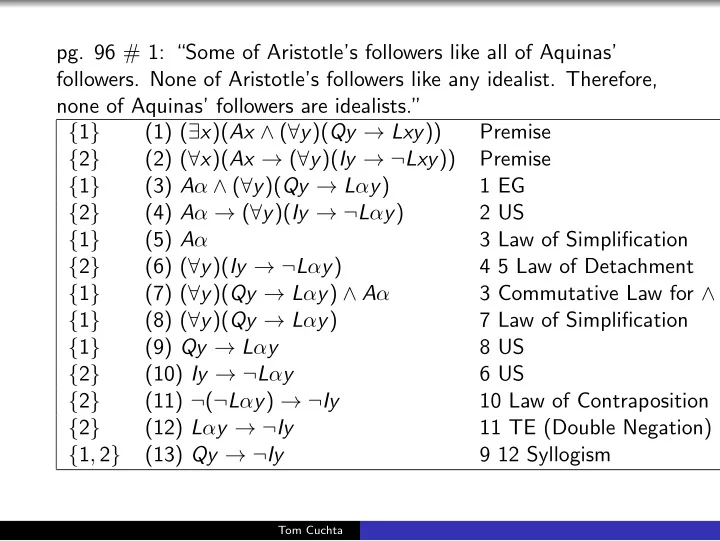

pg. 96 # 1: “Some of Aristotle’s followers like all of Aquinas’ followers. None of Aristotle’s followers like any idealist. Therefore, none of Aquinas’ followers are idealists.” { 1 } (1) ( ∃ x )( Ax ∧ ( ∀ y )( Qy → Lxy )) Premise { 2 } (2) ( ∀ x )( Ax → ( ∀ y )( Iy → ¬ Lxy )) Premise { 1 } (3) A α ∧ ( ∀ y )( Qy → L α y ) 1 EG { 2 } (4) A α → ( ∀ y )( Iy → ¬ L α y ) 2 US { 1 } (5) A α 3 Law of Simplification { 2 } (6) ( ∀ y )( Iy → ¬ L α y ) 4 5 Law of Detachment { 1 } (7) ( ∀ y )( Qy → L α y ) ∧ A α 3 Commutative Law for ∧ { 1 } (8) ( ∀ y )( Qy → L α y ) 7 Law of Simplification { 1 } (9) Qy → L α y 8 US { 2 } (10) Iy → ¬ L α y 6 US { 2 } (11) ¬ ( ¬ L α y ) → ¬ Iy 10 Law of Contraposition { 2 } (12) L α y → ¬ Iy 11 TE (Double Negation) { 1 , 2 } (13) Qy → ¬ Iy 9 12 Syllogism Tom Cuchta
pg. 96 # 3: “None of the paintings is valuable, except the battle pieces. All the battle pieces are painted in oils. Some of the paintings are not painted in oil. Some paintings are not framed. Therefore, none of the paintings not painted in oils is valuable.” { 1 } (1) ( ∀ x )( Px → ( ¬ Vx ∨ Bx )) Premise { 2 } (2) ( ∀ x )( Bx → Ox ) Premise { 3 } (3) ( ∃ x )( Px ∧ ¬ Ox ) Premise { 4 } (4) ( ∃ x )( Px ∧ ¬ Fx ) Premise Conclusion: ( ∀ x )(( Px ∧ ¬ Ox ) → ¬ Vx ) This argument is not valid... try to find an interpretation. Tom Cuchta
pg. 96 # 8: “Every philosophical empiricist admires Hume. Some philosophical idealists like no one who admires Hume. Therefore, some philosophical idealists like no philosophical empiricist.” { 1 } (1) ( ∀ x )( Ex → Hx ) Premise { 2 } (2) ( ∃ x )( Ix ∧ ( ∀ y )( Hy → ¬ Lxy )) Premise { 2 } (3) I α ∧ ( ∀ y )( Hy → ¬ L α y ) 2 ES { 2 } (4) ( ∀ y )( Hy → ¬ L α y ) ∧ I α 3 Commutative Law for ∧ { 2 } (5) ( ∀ y )( Hy → ¬ L α y ) 4 Law of Simplification { 2 } (6) Hy → ¬ L α y 5 US { 1 } (7) Ey → Hy 1 US { 1 , 2 } (8) Ey → ¬ L α y 6 7 Syllogism { 1 , 2 } (9) ( ∀ y )( Ey → ¬ L α y ) 8 UG { 1 , 2 } (10) I α 3 Law of Simplification { 1 , 2 } (11) I α ∧ ( ∀ y )( Ey → ¬ L α y ) 9 10 Law of Adjunction { 1 , 2 } (12) ( ∃ x )( Ix ∧ ( ∀ y )( Ey → ¬ Lxy )) 11 EG Tom Cuchta
pg. 96 # 4: “Some psychologists admire Freud. Some psychologists like no one who admires Freud. Therefore, some psychologists are not liked by all psychologists.” { 1 } (1) ( ∃ x )( Px ∧ Fx ) Premise { 2 } (2) ( ∃ x )( Px ∧ ( ∀ y )( Fy → ¬ Lxy )) Premise Conclusion: ( ∃ x )( Px ∧ ( ∀ y )( Py ∧ ¬ Lxy )) Find an interpretation! x y Px Py Fx Fy Lxy Px ∧ Fx Fy → ¬ Lxy Py ∧ ¬ Lxy 0 0 T F T T F T T F Tom Cuchta
Recommend
More recommend